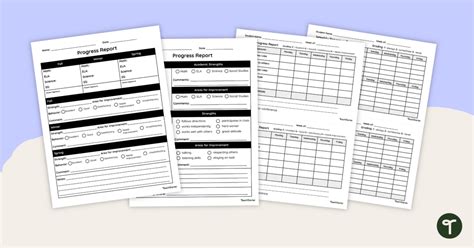As a parent, receiving your child’s progress report is a significant milestone in their educational journey. It provides valuable insights into their academic performance, areas for improvement, and strengths to foster. This guide will delve into everything you need to know about progress reports, empowering you to have meaningful conversations with your child and their teachers.

Importance of Progress Reports
Progress reports are essential for:
- Monitoring Student Progress: They offer a snapshot of a student’s performance and progress relative to grade-level standards.
- Identifying Areas of Strength: Highlighting areas where students excel can boost confidence and provide a foundation for further development.
- Pinpointing Challenges: Progress reports reveal areas where students may need additional support or targeted interventions.
- Facilitating Teacher-Parent Communication: They serve as a bridge between educators and parents, enabling collaboration and support planning.
- Informing Educational Decisions: Progress reports guide parents and educators in making informed decisions about the student’s educational path.
Understanding Your Child’s Progress Report
Progress reports typically include the following information:
- Student Information: Name, grade, classroom, and teacher’s name.
- Academic Performance: Subject-specific grades, assessments, and performance evaluations.
- Behavioral Observations: Notes on student behavior, attitudes, and participation.
- Teacher Comments: Insights from the teacher about the student’s progress and areas for growth.
- Goal Setting: Suggestions for improvement and targets for future achievement.
Having a Meaningful Conversation with Your Child
When reviewing your child’s progress report, ask yourself these questions:
- What does the report reveal about my child’s strengths and areas for improvement?
- What areas need further clarification or explanation?
- How can I support my child’s growth and development?
To have a productive conversation with your child, follow these tips:
- Schedule a time to talk: Choose a time when both you and your child are relaxed and receptive.
- Start with the positives: Begin by acknowledging your child’s accomplishments and areas of strength.
- Discuss areas for improvement: Discuss areas where your child may need additional support or strategies.
- Collaborate on solutions: Work together to develop strategies for improvement and set realistic goals.
- Encourage self-reflection: Ask your child to reflect on their own performance and areas where they may need to improve.
Communicating with Your Child’s Teacher
If you have any concerns or questions about your child’s progress report, don’t hesitate to contact their teacher. Consider these points:
- Schedule a meeting: Request a meeting to discuss your child’s progress and any concerns or questions you may have.
- Come prepared: Gather specific examples and questions to facilitate a meaningful discussion.
- Be open-minded: Listen attentively to the teacher’s perspective and insights.
- Work together: Collaborate with the teacher to develop a plan to support your child’s growth and development.
Frequently Asked Questions (FAQs)
1. How often should students receive progress reports?
Frequency varies depending on school policy. Elementary schools often issue reports every trimester, while high schools may report more frequently (e.g., every six weeks).
2. What if my child’s grades are below average?
Discuss concerns with the teacher to understand the reasons for the performance gap. Work together to develop a plan to support your child’s improvement.
3. How can I support my child’s academic growth outside of school?
Create a home environment that fosters learning, encourage reading, and provide targeted support in areas where they may need additional help.
4. What should I do if I disagree with something in the progress report?
First, discuss concerns with the teacher. If a satisfactory resolution is not reached, consider contacting the school’s principal or administration.
5. How can I track my child’s progress throughout the year?
Maintain open communication with the teacher, attend parent-teacher conferences, and monitor your child’s homework and assignments.
6. What are some ways to motivate my child to improve their grades?
Set achievable goals, encourage effort and progress, provide positive reinforcement, and foster a growth mindset.
Conclusion
Progress reports are indispensable tools that provide valuable insights into a student’s educational journey. By understanding the purpose and different aspects of progress reports, parents can engage in meaningful conversations with their child and collaborate with educators to support their academic growth and development. Remember to approach progress reports with a positive and proactive mindset, nurturing open communication and a shared commitment to student success.
Additional Tips for Parents
- Attend parent-teacher conferences: This is an opportunity to discuss your child’s progress with the teacher and ask any questions you may have.
- Review your child’s work: Ask your child to share their assignments and homework with you to get a better understanding of their learning.
- Encourage your child to set goals: Help your child set realistic goals for themselves and work with them to achieve those goals.
- Stay positive: It is important to stay positive and supportive of your child, even if they are struggling in some areas.
